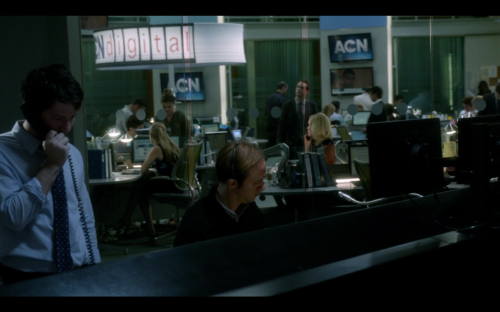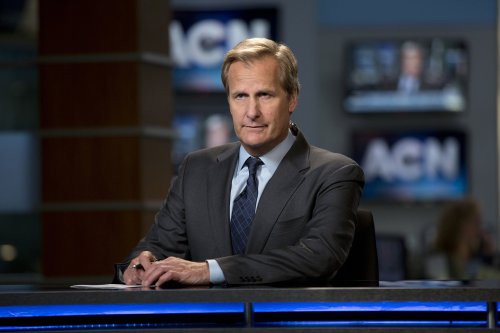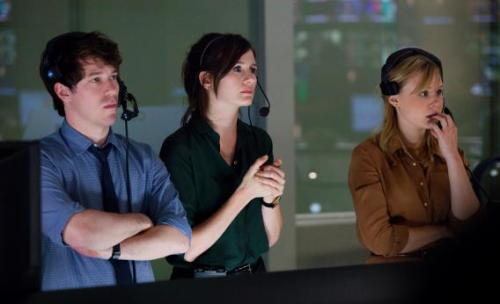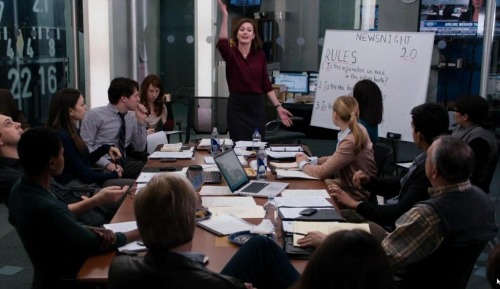
The Newsroom We Need
I live in Arizona, which has been my home for the past eight years. I work in Arizona. I vote in Arizona. This year, I voted early. And tonight, I watched in horror as my Facebook feed filled with the stories of friends—and then friends of friends—who had been denied their legal right to vote. One, two, five, then a dozen times, and growing. One of my friends K, who is in her mid-thirties and has been registered to vote Democrat since she could vote, was told she wasn’t registered with a party. She took her toddler with her to the polls, and, after being told she couldn’t vote, left confused and frustrated.
Many Arizonans trying to vote had to wait in line for three, four, five hours to do so. Some of them did this outside in blazing Arizona heat. Some of them were still waiting in line at 11 p.m., four hours after the polls closed.
Then, not even an hour after the polls officially closed—when only nine percent of the precincts were reporting and people were still waiting in line to vote—the Associated Press called Arizona for Trump and Clinton. How on earth, I thought, was this responsible journalism? How could anyone report with any certainty when the percentage of precincts reporting was so low?

Like many Americans, I watch a lot of television. On my laptop, many episodes at a time. Some of the television I’ve seen is satisfying in the way that french fries are—cutting a craving but not gratifying long-term. Every now and then a show stays percolating in my mind long the last episode.
For weeks, I’ve been immersed in Aaron Sorkin’s The Newsroom. The show is smart and witty, with fleshed-out characters, who are both deeply-flawed and deeply-noble. When I finished the last episode this week, I grieved that the show was over. Not only because of the complicated plotlines, strong acting and pacing, but because the show revolves around the central need for integrity, the desire for capital T Truth, and the tenacity required to get the story right.

The show opens with news anchor Will McAvoy, played by Jeff Daniels, sitting on a panel of journalists at Northwestern University. A student from the audience asks all of the panelists, “What makes America the greatest country in the world?”
“Diversity and opportunity,” answers one journalist.
“Freedom, Freedom, and Freedom, so let’s keep it that way,” says another.
McAvoy avoids answering the question with a straight answer until he is sick of the moderator’s prodding. And then, he does, with a long monologue. He says that America is not the greatest country in the world:
“…There is absolutely no evidence to support the statement that we’re the greatest country in the world. We’re seventh in literacy, twenty-seventh in math, twenty-second in science, forty-ninth in life expectancy, 178th in infant mortality, third in median household income, number four in labor force, and number four in exports. We lead the world in only three categories: number of incarcerated citizens per capita, number of adults who believe angels are real, and defense spending, where we spend more than the next twenty-six countries combined, twenty-five of whom are allies….We sure used to be. We stood up for what was right. We fought for moral reasons, we passed and struck down laws for moral reasons….”
The speech—a lbeit generalizing and nostalgic in a way that misremembers major injustices in American history—is an act of unplanned honesty that galvanizes the show.
For years, McAvoy has been beholden to his ratings but this one moment of candor begins a torrential journey of reporting the news differently. He might not have undertaken this choice without the push from News Division President Charlie Skinner (Sam Waterston) and his old/new executive producer and old/new love interest McKenzie McHale (Emily Mortimer).
And yet, this is the news he knows he has to do. News that asks hard questions of guests, politicians, and administrators; news that helps to shapes the debate; news that reports on difficult and complicated stories and manages to do so in a timely way.
With my fellow Americans, I have watched this election season unfurl into a disaster that looks nothing like the democracy we often claim with pride. Like so many of us, I have ingested countless hours of coverage, watching commentators suss out differences between Hilary and Bernie (on the odd chance he is mentioned), listening to political journalists on the ground reporting Republican state primaries.
I have seen footage of Trump speaking at these rallies: proposing a ban on Muslims immigrating to the U.S., threatening the wives and children of alleged terrorists, calling Mexicans rapists and murderers. I have seen the videos of Black Americans being punched and pushed out of Donald Trump rallies as he yells, from the platform, “Get ‘em out of here!” Most recently, at a Trump rally in Tucson, a protestor was peacefully exiting the convention center when a Trump supporter sucker-punched him the face before violently kicking him on the ground—this while Trump supporters behind the brawl cheered and threw up their hands in celebration and Trump spoke into the mic calling him a “trouble-maker,” telling the crowd that protestors like this one were “taking away our First Amendment Rights.”

The Newsroom takes place in the not too distant past and reflected back to us almost in real time. The show aired in 2012-2014, with storylines beginning in 2010 and ends in 2013, and viewers see those stories we remember flickering across our monitors and TV screens: the Deepwater Horizon oil spill, the shooting in Tucson of Gabrielle Giffords and eighteen others, the Boston Marathon bombing.
We begin to see all that goes into getting it right. We see beyond the anchor to a cast of producers, reporters, cameramen, editors, technicians, and digital experts. We watch them securing the guests, drafting questions, checking the facts, deciding what to include and exclude, creating the graphics, editing content, and finally putting the news on the air.
As we get to know the characters, we witness their intense desire to break the news—but more than that, the obsession to get the story right. We feel their accountability to viewers, demonstrated by long hours in the field and a willingness to take responsibility for their journalistic fuckups.
I fell in love with the characters not only because of the thoughtfulness with which they are written, but because these are the people I need right now in the current political climate. Smart, conscientious, people—imperfect but striving—who are doing their best to communicate really complex issues to a community that desperately needs that dialogue.

The problem with calling primaries with only nine percent of precincts reporting and people still standing in line is that you can’t be sure you got it right. And you are also telling the people in line to go home, that it’s all over. It’s irresponsible.
The problem with media covering Donald Trump’s candidacy incessantly is not only that his name has become ubiquitous, filling and filling airwaves and inflating his importance. The problem is that the media has been covering Donald Trump’s candidacy incessantly without editorial intervention. They’ve reported on the appalling things Donald Trump has said without mentioning how appalling it is that he said them. In an effort to be perceived as “fair and balanced,” many mainstream media outlets have failed to fulfill the media’s oldest role of watchdog. It’s irresponsible.
That the honesty of these TV-portrayed journalists has resonated so deeply with me—to the point that I miss them like friends—makes me realize how much I am craving honest dialogue in the media. While some journalists are working hard to do this, some networks and news outlets seem less concerned with speaking the capital T truth and widening their scope of perspectives than with not making waves. A recent example is the firing of Melissa Harris-Perry, a television host whose show was recognized for its diversity of guests in terms of gender and ethnicity. The show was canceled after she wrote a critical letter of MSNC to her staff members about feeling that her show was being deprioritized by the network.

The Newsroom’s Will McAvoy is a Republican and in Season 2’s “Election Night: Part II” he is asked by a Republican political analyst on his show about this affiliation. She asks him: “Do you call yourself a Republican so you can make a claim to credibility when you attack the GOP?”
He responds, “No, I call myself a Republican because I am one. I believe in market solutions and common sense realities and the necessity to defend ourselves against a dangerous world and that’s about it. The problem is now I have to be homophobic. I have to count the number to times people go to church. I have to deny facts and think scientific research is a long con. I have to think poor people are getting a sweet ride. And I have to have such a stunning inferiority complex that I fear education and intellect…in the 21st century. But most of all, the biggest new requirement, really the only requirement is that I have to hate Democrats…..”
In a party that has such requirements not only in fictional TV but in real life, we see a presidential candidate who has won twenty primaries regularly threatening people because of their nationality, ethnicity, or chosen religion. How is it that when Donald Trump decries and threatens people he is not universally written off by media professionals as reprehensible? I’m all for difference of opinion but what about when that difference requires the scapegoating of entire groups of people?
Last week, The New York Times columnist David Brooks took responsibility for his own participation in the maelstrom of attention to Trump and in the underestimation of Trump and the undercurrent of his rise. He wrote, “Trump voters are a coalition of the dispossessed. They have suffered lost jobs, lost wages, lost dreams. The American system is not working for them, so naturally they are looking for something else. Moreover, many in the media, especially me, did not understand how they would express their alienation. We expected Trump to fizzle because we were not socially intermingled with his supporters and did not listen carefully enough. For me, it’s a lesson that I have to change the way I do my job if I’m going to report accurately on this country.”
We need our media to get real. We need their honesty and integrity. We need to stop calling hate a difference of opinion. We need to ask hard questions and demand answers. And we need to stop elevating the voices of candidates who are more concerned with the sound of their own voice than they are with the voices of the American people.
In the final minutes of the first episode of The Newsroom, just after reporting an in-depth coverage of a breaking news story, News Division Director Charlie Skinner meets McAvoy at the anchor desk. “In the old days, of about ten minutes ago, we did the news well,” Skinner says. “You know how? We just decided to.”
